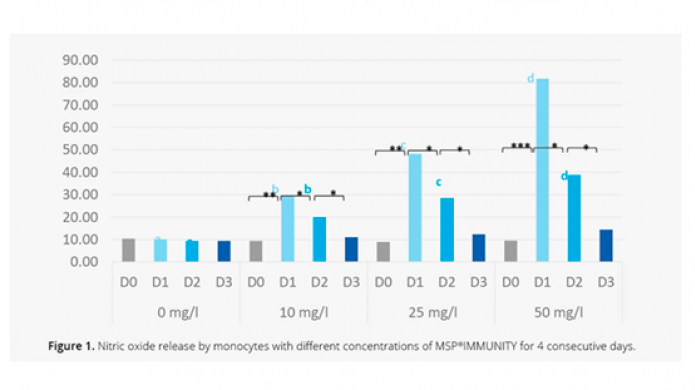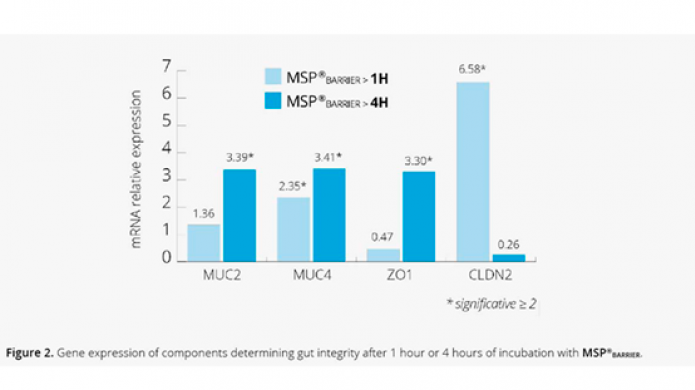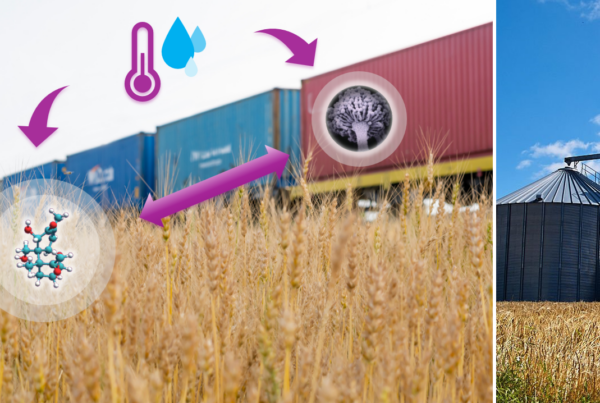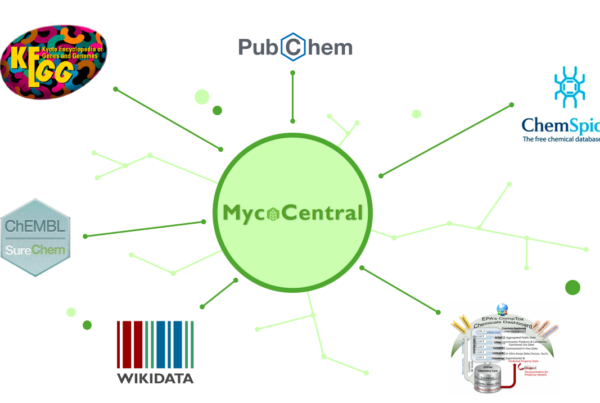Algimun® supports poultry immune system and preserves the integrity of the digestive system.
Modern poultry production has dramatically changed in the last years driven by an increasing consumer demand. The immune requirements vary throughout the production cycle depending on the physiological status and are also influenced by external factors. Among external factors, environmental stress such as temperature or stocking density, management stress such as vaccination programs, feed stress such as transitions or presence of toxins can really impact the animals’ immune status and thus performance. Besides, sanitary pressure greatly impacts immunity and thus again performance. This situation is aggravated if animals already present a low level of immunity.
The implementation of new regulations aiming at the ban of the inclusion of antibiotics in broilers diets as a routine mean of growth promotion has led to an intensive research effort to identify alternative bioactive compounds that are able to promote animal health and performance. The modulation of the animal’s immune function is another approach leading to a higher resilience degree against external aggressors such as infectious agents. The goal is to make animals able to better face daily challenges. Recent research has highlighted the potential of in-feed marine macroalgal polysaccharides as a reliable solution to strengthen animal defenses. They are also a powerful tool to achieve performance potential in modern production systems, as well as good candidates as alternatives to in-feed antibiotics in animal husbandry.

Macroalgal extracts specificities and Olmix Group technology
The cell wall of marine macroalgae is mainly composed of water-soluble sulfated polysaccharides which present a complex structure. The molecular weight and several structural specificities, including branched conformation, presence of several sugars and more particularly rare ones (xylose and rhamnose) and sulfation, confer to algal polysaccharides unique biological activities. Among others, modulation of the immune response and reinforcement of the gut barrier function are being investigated. Sulfated polysaccharides are specific from marine macroalgae (they are not found in terrestrial plants, nor fresh water microalgae or yeast cell walls) as marine environment is the only one where sulfur chemical form can be integrated in the structure of organisms. Thanks to all these structural specificities, marine sulfated polysaccharides possess structural analogies with animal’s glycosaminoglycans (GAG’s), like heparin. This explains their high degree of reactivity and specific biological activities when fed to animals.
Olmix Group innovative technology and marine bioactive ingredient extraction know-how lead to the development of an in-feed product, Algimun®, which is based on the combination of two biologically active macroalgal extracts: MSP®IMMUNITY which constitutes an innovative modulating agent that reinforces innate and adaptive immune responses; and MSP®BARRIER, which enhances the barrier function of the intestinal mucosa
Assessing the immunomodulating and gut barrier promoting activities of algae extracts
MSP®IMMUNITY
The immunomodulating activity of MSP®IMMUNITY (extracted from green macroalgae Ulva sp.) was first evidenced on porcine intestinal epithelial cells in vitro (Berri et al., 2016). MSP®IMMUNITY induced the transcription of several immune mediators involved in the activation, recruitment and migration of macrophages and dendritic cells (professional antigen-presenting cells), as well as differentiation and recruitment of lymphocytes, and induction of anti-inflammatory properties, thus raising interest for its use as an immunomodulating agent. This activation was shown to derive from the activation of the pattern recognition receptors (PRR) Toll-like receptors (TLR) 4 and 2 (Berri et al., 2017).
Further research has been conducted in poultry models in order to demonstrate the ability of MSP®IMMUNITY to enhance innate and adaptative immune response of poultry through activation of heterophils and monocytes (Guriec et al., 2018). Heterophils are functionally equivalent to mammalian neutrophils and are a critical component of innate immunity (He et al., 2007). Their activity can be evaluated by measuring the oxidative burst (release of reactive oxygen species (ROS) with bactericidal activity) and/or by conducting a degranulation assay, assessing the enzymatic activity of glucuronidase also able to degrade viruses and bacteria. Monocytes are important phagocytes in poultry, playing a critical role in both innate immunity (bactericidal activity via nitric oxide (NO) production) and initiation of the adaptive immune response (via their role as antigen-presenting cell) (He et al., 2006).

The effect of MSP®IMMUNITY on birds’ monocytes and heterophils (purified from peripheral blood of broilers) was evaluated in vivo (Guriec et al., 2018). Three different concentrations of MSP®IMMUNITY (10, 25, 50mg/L) were given orally (per os) to 28 day-old broilers (first day of the trial) for 24 hours and compared with the negative control 4 days later. Results showed that MSP®IMMUNITY induced the activation of monocytes and heterophils. A dose and time response was observed for nitric oxide release by monocytes with a peak at day 1, swiftly declining, with values no longer statistically different from that of the negative control at day 3 (Figure 1). In parallel, the ability of MSP®IMMUNITY to induce glucuronidase activity in heterophils was also occurring in a time and dose-dependent manner.
Moreover, the study showed that the activation of monocytes and heterophils led to a transient increase of immune mediator transcription, including interleukin 1-β, interferon-α and interferon-γ. These cytokines are produced during innate immune responses and play an important role as activators of adaptive immune responses via the differentiation of Th1 cells that will determine cell-mediated immunity: antigen presentation activity of macrophages and induction of lymphocytes B to synthetize opsonizing antibodies.
MSP®BARRIER
A series of trials in collaboration with the French research center Intestinal Biotech Development (2017) evaluated the effect of MSP®BARRIER on the function of the intestinal barrier. The studies used two in-vitro models, the mucus secreting cell-line HT-29 MTX for the evaluation of mucin production and the Caco-2 cell-line for the evaluation of tight junction proteins. The results showed that MSP®BARRIER upregulates the gene expression of transmembrane proteins such as claudin 2 (CLDN-2) and scaffolding proteins such as zonula occludens 1 (ZO-1), which are essential for the optimal functioning of tight junction multiproteic complexes. In addition, MSP®BARRIER increases the expression of genes that have crucial activities in the intestinal epithelium, such as regulation of the differentiation of epithelial cells, the establishment of the mucus layer (MUC-2) and the prevention of colonization by pathogens (MUC-4) (Figure 2).

MSP®BARRIER plays an important role in maintaining the integrity of the intestinal mucosa by making the tight junctions stronger and the mucus layer that covers the epithelium more functional. These results were corroborated in a scientific study carried out at INSERM (France, 2018), where the supplementation of MSP®BARRIER to mice submitted to stress (model known to induce intestinal inflammation) significantly reduced the paracellular transport of sulfonic acid conjugated with FITC (intestinal permeability marker) to the blood. Therefore, supplementation of MSP®BARRIER to stressed animals significantly reinforced the function of the intestinal barrier, which is the first line of innate immune defense against pathogens and toxins.
Conclusion
Algimun® algal bioactive compounds boost animal’s immune function and reinforce the intestinal barrier function as observed in scientific and commercial trials by a shift from innate to adaptive immunity (decreased heterophil to lymphocyte ratio), improve gut protection (higher plasmatic IgA levels) and improve technical performance. The use of Algimun® can play an important role within the reduction of antibiotics in the feed.




